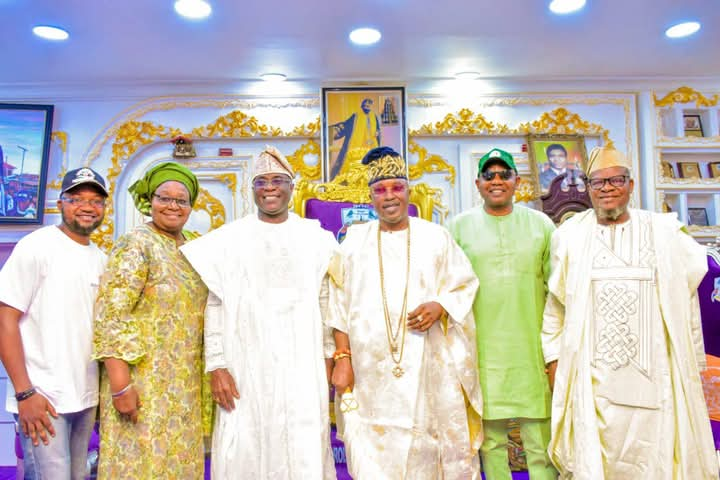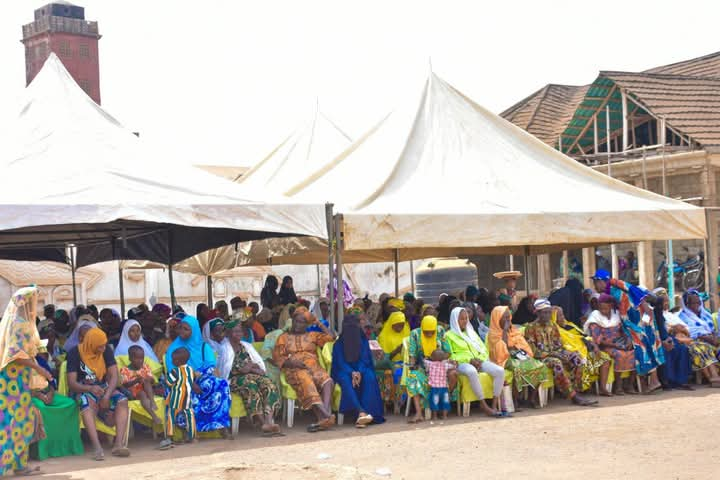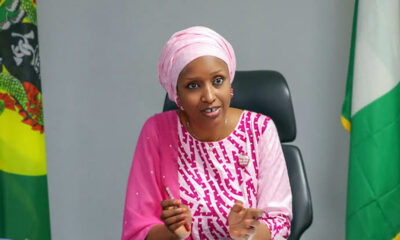News
United States: Nigeria is one of our most important partners

United States Secretary of State Antony J. Blinken on Tuesday participated in a virtual visit to Nigeria, where he met with President Muhammadu Buhari and Foreign Minister Geoffrey Onyeama. Secretary Blinken, President Buhari, and Foreign Minister Onyeama discussed continuing joint efforts to counter terrorism and insecurity, strengthen health systems, support democratic institutions, bolster economic growth, advance gender equality, and boost bilateral trade between the United States and Nigeria. Two fact sheets released on Tuesday by the United States government unveil the gains of U.S.-Nigeria relations:
U.S.-Nigeria relations
With Africa’s largest population, democracy, and economy, Nigeria is one of our most important partners on the continent.
The year 2020 served as an historical benchmark, as Nigerians reflected on the opportunities and challenges the country faces while marking its 60th anniversary of independence and bilateral relations with the United States.
Nigeria is the largest source of immigrants from Africa to the United States, with more than 500,000 Nigerian-born American citizens and legal residents in the U.S.
Pandemic response and health diplomacy
The United States and Nigeria have collaborated closely to combat the COVID-19 pandemic. More than 60 interagency members from the U.S. Mission worked side-by-side with Nigerian counterparts on the Presidential Task Force on COVID-19 to plan and respond to the disease.
The United States has contributed more than $73 million in COVID-related equipment and technical assistance. This includes the delivery of a mobile field hospital, 200 ventilators, epidemiological COVID detection surveys, personal protective equipment, provision of rapid response teams, training of over 200,000 military and civilian personnel on COVID-19 control measures, and technology transfer for virtual training.
Ongoing U.S. health programs reach more than 60 million Nigerians with lifesaving services, including by training public health workers and improving access to quality medicines, vaccines, medical facilities, and reproductive health materials.
The President’s Emergency Plan for AIDS Relief (PEPFAR) has worked with the Government of Nigeria since 2004 to provide HIV and TB care and treatment services, with a momentum propelling Nigeria toward epidemic control within two years. As of December 2020, more than 1.2 million people receive PEPFAR-supported HIV treatment, and our partners placed 350,000 new patients on lifesaving antiretrovirals despite the COVID-19 pandemic.
Since 1997, the United States has directly supported polio surveillance and polio campaigns that reached nearly all of Nigeria’s 33 million children under 5 years of age, contributing to Nigeria being certified as wild polio-virus free in 2020.
Since 2011, the President’s Malaria Initiative has procured more than 60 million insecticide-treated nets, 46 million rapid diagnostic test kits, 87 million treatment courses for malaria, and 20 million doses of malaria prophylaxis during pregnancy, as part of over $690 million contributed to malaria control in Nigeria.
Nigeria is a key U.S. partner in the Global Health Security Agenda (GHSA). The mission approved $3.4 million in FY 2020 GHSA funding for capacity building programs to strengthen zoonotic surveillance labs, infection-prevention control, antimicrobial resistance, and risk communication.
Bilateral economic engagement
Nigeria is our second largest trading partner in Africa; two-way trade between our nations expanded to over $10 billion in 2019. The United States is proud to be one of the largest foreign investors in Nigeria. S. support for economic growth includes funding $8.5 million in feasibility studies and technical assistance in 2020-2021, extending loan guarantees worth up to $80 million, and coordinating development finance in important sectors such as agriculture, healthcare, renewable energy, and information and communication technology. These activities support bilateral trade and investment ties while building more modern and sustainable infrastructure across Nigeria.
Through Feed the Future, the United States supports private sector expansion of markets, as well as the introduction of techniques to increase productivity, strengthen resilience, and improve nutrition for more than two million farmers and their communities.
Since its launch in 2013, Power Africa has mobilized $4.3 billion in financing and connected nearly two million households and businesses in Nigeria. Power Africa helps to attract private sector investment and supports the rollout of both on-grid and renewable off-grid electricity connections in order to spur economic growth and reduce poverty.
Educational and cultural exchanges
With over 100,000 travelers to the United States each year, Nigerians boost American businesses, colleges, and universities. There are over 8,800 education and exchange program alumni from Nigeria and the United States.
Nigeria sends more students to American colleges and universities than any other country in Africa and is the eleventh largest source worldwide of international students to the United States. In Academic Year 2019-2020, a record-breaking number of nearly 14,000 Nigerians pursued U.S. graduate and undergraduate degrees, bringing an estimated $501 million to communities across America. In 2020, advisees of EducationUSA services received scholarships worth $28 million.
The United States provided more than 9 million teacher’s guides and books in five of Nigeria’s most widely spoken languages to advance early grade reading.
Striving for peace and security
Northeast Nigeria has become one of the world’s most challenging and complex humanitarian crises. The United States is the largest humanitarian donor in response to the crisis, providing $1.45 billion since 2015 and supporting almost two million conflict-affected households.
Since 2017, Department of State and Department of Defense security assistance for Nigeria totals approximately $650 million, including $500 million in Foreign Military Sales. The United States looks forward to delivering twelve A-29 Super Tucano aircraft this year. Nigeria also has one of the largest International Military-Education and Training (IMET) programs in Sub-Saharan Africa.
The United States promotes strong and broad collaboration between government and civil society at all levels, including civil society organizations led by women and members of marginalised groups. We also support the establishment of robust early warning systems to identify and mitigate drivers of communal conflict and violence in vulnerable states.
We provide technical assistance, and train and equip law enforcement and judiciary professionals to address a wide range of priorities, ranging from stopping banditry to protecting intellectual property rights to more effectively addressing trafficking in persons and gender-based violence. Law enforcement programming focuses on building capacity for civilian security actors, particularly the Nigeria Police Force.
As the Gulf of Guinea has become the world’s hotspot for piracy and armed robbery at sea, Nigeria has stepped up efforts to stem this problem, including a new initiative, Deep Blue, consisting of vessels, shoreside infrastructure, and personnel that can be dispatched to respond to piracy incidents. It is expected to become operational by mid-2021. U.S. efforts to stem piracy in the Gulf of Guinea help to strengthen maritime governance, enable the development of sustainable, maritime-based economies, and protect international maritime commerce.
Young African Leaders Initiative
The Young African Leaders Initiative (YALI) is the U.S. government’s signature effort to invest in the next generation of African leaders. Since 2010, YALI has graduated more than 24,000 alumni from the Mandela Washington Fellowship exchange program and its four Regional Leadership Centers (RLCs) located across the continent, while membership in the online YALI Network community numbers over 700,000.
YALI alumni have risen to high-ranking leadership positions in the public and private sectors and been recognized with international awards. Five alumni have held or currently hold cabinet-level positions, a Ghanaian Fellowship alumnus and Kenyan RLC alumna won first and second prize in Africa.com’s 2020 Brilliant African Innovations Against COVID-19 Competition, and a Somali Fellowship alumna was nominated for the Nobel Peace Prize in 2019.
United States Secretary of State Antony J. Blinken yesterday participated in a virtual visit to Nigeria, where he met with President Muhammadu Buhari and Foreign Minister Geoffrey Onyeama. Secretary Blinken, President Buhari, and Foreign Minister Onyeama discussed continuing joint efforts to counter terrorism and insecurity, strengthen health systems, support democratic institutions, bolster economic growth, advance gender equality, and boost bilateral trade between the United States and Nigeria. Two fact sheets released yesterday by the United States government unveil the gains of U.S.-Nigeria relations:
With a population of 1.3 billion people whose median age is 19 years old, Africa’s youth are one of the continent’s most important resources. YALI, along with other U.S.-sponsored people-to-people initiatives, showcases the U.S. government’s commitment to strengthening the ties among the people of the United States and Africa. Through its programs, YALI promotes effective public administration; fosters networks that connect people; creates conditions for peace, prosperity, and security; and provides investment opportunities for U.S. businesses.
- Mandela Washington Fellowship for Young African Leaders: Launched in 2014, this flagship program brings 700 Fellows aged 25-35 to the United States each year to participate in six-week Leadership Institutes, studying Business, Civic Engagement, or Public Management at U.S. colleges or universities. During their time on campus, Fellows connect with Americans and enrich local U.S. communities while sharing best practices. The Reciprocal Exchange component provides opportunities for Americans to travel to Africa to work with Fellowship Alumni on issues of importance to both the United States and Africa while contributing to U.S. public diplomacy efforts.
- Regional Leadership Centers: Managed by the United States Agency for International Development, the RLCs provide YALI’s signature on-continent leadership and professional development training experiences at higher education institutions in Nairobi, Kenya; Dakar, Senegal; Accra, Ghana; and Pretoria, South Africa. Since 2015, they have provided more than 20,000 young leaders aged 18-35 with?state-of-the-art leadership training in three tracks: public management, civic engagement, and business and entrepreneurship. The RLCs leverage resources from the private sector, both U.S. and African companies, and serve as a place for regional collaboration. They offer training primarily in English, with some offerings in French and Portuguese.
- YALI Network: The YALI Network is a virtual community of more than 700,000 members across Sub-Saharan Africa. Through its digital campaigns, the YALI Network develops members’ capacity to advocate for U.S. policy priorities in a local context. To support these campaigns, the Network’s website provides vital online resources, content, and courses. In addition to online activities, campaigns inspire offline advocacy by encouraging members to lead service activities and to hold “YALILearns” events, during which members facilitate community dialogues on policy-focused campaign topics.
News
Relief Radiant Hearts Foundation Launched in Iwo, Promises Hope for the Vulnerable

Relief Radiant Hearts Foundation Launched in Iwo, Promises Hope for the Vulnerable
March 3, 2026
The ancient town of Iwo, Osun State, witnessed a significant humanitarian milestone on Sunday, March 1, 2026, as the Relief Radiant Hearts Foundation (RRHF) was officially launched at the Palace of the Oluwo of Iwo.
 The colourful ceremony, held at the revered Oluwo Palace, attracted dignitaries, traditional rulers, government officials, medical professionals, education stakeholders and community leaders from within and beyond Iwoland.
The colourful ceremony, held at the revered Oluwo Palace, attracted dignitaries, traditional rulers, government officials, medical professionals, education stakeholders and community leaders from within and beyond Iwoland.
Royal Endorsement and Vision
Chairman of the Board of Trustees of the Foundation, Alhaji Liad Tella, expressed deep appreciation to the Oluwo of Iwo, Oba Abdul Rasheed Adewale Akanbi, for his royal blessings, fatherly guidance and unwavering support which paved the way for the successful unveiling of the foundation.
Alhaji Tella stated that RRHF is built on the core values of integrity, transparency, accountability and sincerity of purpose. He commended the Coordinator of the Foundation, Asiwaju Anifowose Rahman, describing his passion as a driving force behind the initiative’s mission to reduce hardship, empower the less privileged through education and restore dignity to vulnerable members of society.
 According to him, what began as a seed of compassion has blossomed into a tree of hope, stressing that divinely inspired visions often attract support from unexpected quarters.
According to him, what began as a seed of compassion has blossomed into a tree of hope, stressing that divinely inspired visions often attract support from unexpected quarters.
In his royal remarks, Oba Akanbi lauded the initiative, noting that it would help reduce poverty, inspire hope and strengthen communal bonds within Iwo and its environs.
Chieftaincy Honour for UCH CMD
A major highlight of the event was the conferment of the prestigious chieftaincy title of Baasegun Ariwajoye of Iwoland on the Chief Medical Director of the University College Hospital (UCH), Professor Jesse Abiodun Otegbayo.
Professor Otegbayo described the launch as “the unveiling of hope and the institutionalization of compassion,” emphasizing the urgent need for structured and sustainable humanitarian interventions in the face of widening socio-economic gaps.
He praised the visionaries behind the foundation for transforming compassion into an enduring institution capable of delivering measurable impact.
The UCH management team present at the ceremony included Mrs. I.O. Olaleye, Acting Director of Administration; Mrs. Fawole, Head of General Administration; Mr. Akintola, Head of Transport; and Mrs. Obafunmilayo Adetuyibi, Head of Public Relations, among other staff members.
Academic Excellence Competition
Demonstrating its commitment to educational empowerment, the Foundation organized an Academic Excellence Competition as part of the launch activities.
Olaniyan Abdulsomod Olawale of Muslim Comprehensive High School, Isokan, emerged as the Overall Best Student and received a gold medal alongside a full scholarship to any public university of his choice in Nigeria.
Zakariyah Hameedah of Iwo Grammar School secured second place and was awarded full sponsorship for WAEC, NECO and JAMB registration, while Taofeek Ajimoh of St. Anthony Catholic Grammar School, Iwo, finished third and received full sponsorship for WAEC and NECO registration.
Two other outstanding students — Adigun Oluwatoyin Esther of Baptist High School, Iwo, and Atilola Ameeroh Demilade of Anwar-ul-Islam Grammar School, Iwo — were also recognized and rewarded with gifts in appreciation of their commendable performances.
In a further show of community support, the Host of the Day, Engr. Alamu Akeem Adelani, pledged to sponsor the WAEC and NECO fees of the two outstanding students on behalf of Omoba Dotun Babayemi (ODB).
Community Outreach and Collective Responsibility
Another key highlight of the ceremony was the distribution of food items to members of the community, reflecting the foundation’s core mandate of compassion, relief and service to humanity.
Special appreciation was extended to the Executive Chairman of Iwo Local Government, members of the Executive Council, EAS officials, honourable councilors, the CEO of Coastline, and prominent sons and daughters of Iwo both at home and in the diaspora who contributed to the success of the event.
Speakers at the ceremony described the Relief Radiant Hearts Foundation as more than an organization, but a symbol of unity, compassion and collective responsibility.
As the event concluded with prayers of gratitude to Almighty Allah, stakeholders expressed optimism that the foundation would bridge social gaps, uplift vulnerable groups and position Iwo as a beacon of structured humanitarian service in Nigeria.
Relief Radiant Hearts Foundation Launched in Iwo, Promises Hope for the Vulnerable
News
Human Rights Lawyer Warns Against Targeting Children, Hospitals in U.S – Israel Military Action

Human Rights Lawyer Warns Against Targeting Children, Hospitals in U.S – Israel Military Action
Human rights lawyer Deji Adeyanju has urged the United States and Israel to fully respect international humanitarian law and the Geneva Conventions in their ongoing military action against Iran, warning that targeting civilians, children, hospitals and other protected populations constitutes a serious violation of the laws of war.
Speaking in a statement on Monday, Adeyanju said that even amid heightened conflict, combatants have clear legal obligations under international law to distinguish between military targets and civilians. He noted that deliberate attacks on non‑combatants and protected infrastructure such as hospitals and schools are prohibited under global legal norms aimed at minimizing human suffering during armed conflict. This framework is central to the Geneva Conventions and their Additional Protocols, which require parties to a conflict to take all feasible precautions to safeguard civilians and avoid harm to civilian objects.
“The United States and Israel must respect the Geneva Convention in their war with Iran. Children, hospitals, the civil population and vulnerable people must not be targeted,” Adeyanju said, emphasizing that failure to uphold these principles could amount to serious violations under international law.
READ ALSO:
- Several U.S. Warplanes Crash in Kuwait Amid Ongoing Iranian Strikes
- Wike Blasts Kingibe Over FCT Council Election Remarks
- Israeli Airstrikes Kill 31 in Lebanon as Hezbollah Loses Senior Figures
International humanitarian law (IHL) — the body of legal rules that govern armed conflict — protects those who are not taking part in hostilities, including civilians, medical personnel and humanitarian workers, and restricts how warfare may be conducted. Under IHL, parties must always distinguish between combatants and civilians and refrain from deliberate attacks on civilian objects even if military activity is occurring nearby.
Adeyanju’s appeal comes amid sharp escalations in the Middle East, where recent U.S. and Israeli military strikes inside Iran have sparked retaliatory attacks by Tehran and heightened fears of a wider regional conflict involving multiple state and non‑state actors. Various international actors, including the European Union, have called for “maximum restraint” and full compliance with international law in responding to the crisis, urging the protection of civilian lives and strict adherence to humanitarian norms.
Similarly, international legal and humanitarian organisations, such as the International Committee of the Red Cross (ICRC) and the United Nations human rights chief, have reiterated that the laws of war apply regardless of the political objectives of the parties involved, and that the safety of civilians must remain paramount. They have called for all sides to uphold the rules of armed conflict and protect medical personnel, hospitals, homes and schools from attack.
Critics of the escalation have underscored the devastating toll that indiscriminate or disproportionate use of force can have on civilian populations, not only in the immediate conflict zone but also across neighbouring regions struggling with displacement, economic instability and humanitarian needs.
Adeyanju stressed that adherence to international humanitarian law and the Geneva Conventions is not merely aspirational but a legal and moral obligation for all parties in hostilities. He reiterated that the protection of innocent lives, especially children and vulnerable civilians, should remain central to any legitimate military action and urged greater international accountability for violations.
Human Rights Lawyer Warns Against Targeting Children, Hospitals in U.S – Israel Military Action
News
Presidency Denies Alleged Poison Plot Against President Tinubu, Calls Viral Report Fake

Presidency Denies Alleged Poison Plot Against President Tinubu, Calls Viral Report Fake
The Presidency of Nigeria has firmly denied claims circulating online that a chef at the Aso Rock Presidential Villa attempted to poison President Bola Ahmed Tinubu, describing the viral report as false, misleading, and fabricated.
In a statement released on Sunday, the Special Adviser to the President on Information and Strategy, Bayo Onanuga, dismissed the social media video suggesting that security operatives had arrested a kitchen staff member in connection with an alleged poisoning attempt. The statement emphasised that the report is “fake news” with no credible source or evidence.
The viral video, which gained significant traction across social media platforms, alleged that intelligence reports uncovered suspicious activities in the presidential kitchen, prompting the deployment of special security units and the launch of a covert investigation. However, the Presidency categorically refuted these claims, stating:
“There was no attempt to poison the President, and no kitchen staff member was arrested in connection with any such plot. The story being circulated is entirely fabricated and should be disregarded.”
READ ALSO:
- Saudi Arabia Denies Lobbying US to Strike Iran as Gulf States Respond to Escalation
- NDLEA Dismantles Meth Lab, Arrests Long‑Wanted Drug Kingpin in Imo
- Military Kills Boko Haram/ISWAP Insurgents, Recovers Weapons, Armed Drone in Borno
Officials clarified that the video consisted of unrelated clips combined with a dramatic voice-over, likely aimed at creating panic and generating online engagement. The statement urged members of the public, journalists, and media outlets to verify information through official channels before sharing sensitive claims, particularly those involving national security.
Security analysts noted that misinformation targeting high-profile political figures can spread rapidly online, often fueled by sensational narratives, and warned that such false reports could undermine public trust in national institutions.
As of the filing of this report, no security agency has independently confirmed the alleged incident. Multiple reputable news outlets have reinforced the official denial, highlighting that the alleged poisoning attempt did not occur.
The Presidency reiterated its commitment to transparency and responsible communication, assuring Nigerians that any genuine security threats involving the President would be addressed through proper official channels. Citizens are advised to remain calm and avoid amplifying unverified information capable of causing panic or destabilising public discourse.
Presidency Denies Alleged Poison Plot Against President Tinubu, Calls Viral Report Fake
-

 International2 days ago
International2 days agoAyatollah Ali Khamenei, Iran’s Supreme Leader, Dies After U.S.–Israeli Strikes
-

 International2 days ago
International2 days agoIran: US, Israel launch another strikes, Commander, Defence leader, five other top officials killed
-

 International3 days ago
International3 days agoMiddle East on Edge as Iran Retaliates Against Israel, U.S Bases
-

 International2 days ago
International2 days agoKamala Harris Slams Trump for Dragging U.S. Into ‘Unwanted War’ in Iran Conflict
-

 metro2 days ago
metro2 days agoHajj, Umrah Are for Muslims Only – Scholar Urges NAHCON to Tighten Screening
-

 International1 day ago
International1 day agoIran Retaliates: Gulf States Allied With US Hit by Missiles, Drones
-

 International1 day ago
International1 day agoSaudi Arabia Denies Lobbying US to Strike Iran as Gulf States Respond to Escalation
-

 International2 days ago
International2 days agoBREAKING: Iran Forms Three-Member Leadership Council to Steer Country After Khamenei’s Death















